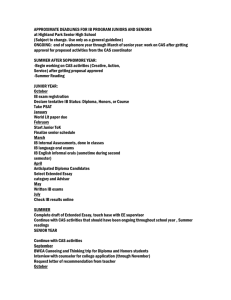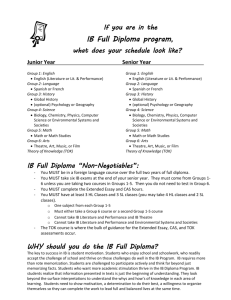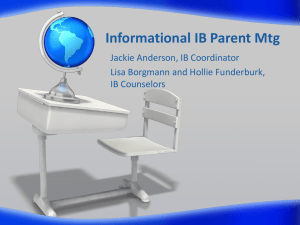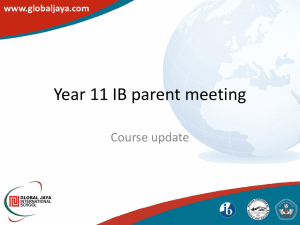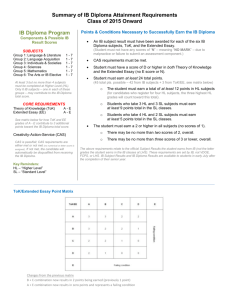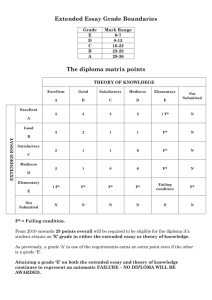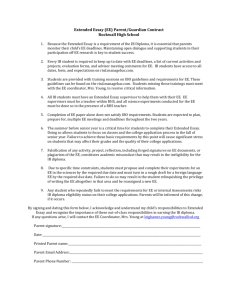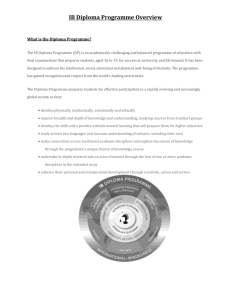IB Info Booklet
advertisement
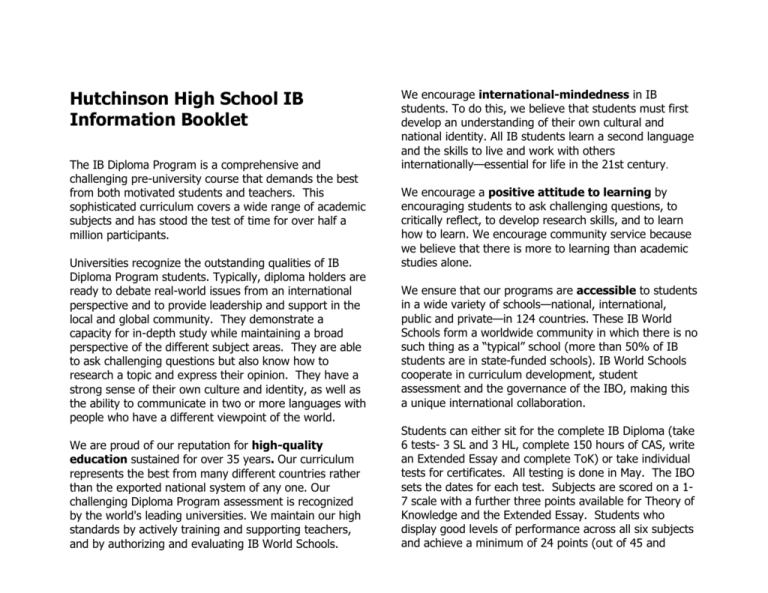
Hutchinson High School IB Information Booklet The IB Diploma Program is a comprehensive and challenging pre-university course that demands the best from both motivated students and teachers. This sophisticated curriculum covers a wide range of academic subjects and has stood the test of time for over half a million participants. Universities recognize the outstanding qualities of IB Diploma Program students. Typically, diploma holders are ready to debate real-world issues from an international perspective and to provide leadership and support in the local and global community. They demonstrate a capacity for in-depth study while maintaining a broad perspective of the different subject areas. They are able to ask challenging questions but also know how to research a topic and express their opinion. They have a strong sense of their own culture and identity, as well as the ability to communicate in two or more languages with people who have a different viewpoint of the world. We are proud of our reputation for high-quality education sustained for over 35 years. Our curriculum represents the best from many different countries rather than the exported national system of any one. Our challenging Diploma Program assessment is recognized by the world's leading universities. We maintain our high standards by actively training and supporting teachers, and by authorizing and evaluating IB World Schools. We encourage international-mindedness in IB students. To do this, we believe that students must first develop an understanding of their own cultural and national identity. All IB students learn a second language and the skills to live and work with others internationally—essential for life in the 21st century. We encourage a positive attitude to learning by encouraging students to ask challenging questions, to critically reflect, to develop research skills, and to learn how to learn. We encourage community service because we believe that there is more to learning than academic studies alone. We ensure that our programs are accessible to students in a wide variety of schools—national, international, public and private—in 124 countries. These IB World Schools form a worldwide community in which there is no such thing as a “typical” school (more than 50% of IB students are in state-funded schools). IB World Schools cooperate in curriculum development, student assessment and the governance of the IBO, making this a unique international collaboration. Students can either sit for the complete IB Diploma (take 6 tests- 3 SL and 3 HL, complete 150 hours of CAS, write an Extended Essay and complete ToK) or take individual tests for certificates. All testing is done in May. The IBO sets the dates for each test. Subjects are scored on a 17 scale with a further three points available for Theory of Knowledge and the Extended Essay. Students who display good levels of performance across all six subjects and achieve a minimum of 24 points (out of 45 and within the parameters of Article 11-12) are awarded the diploma. All others receive a certificate for each subject completed. Other projects will be due at various times throughout the year according to each teacher. IB Biology SL/HL Prerequisite: Honors Life Science, Honors Earth Science, Honors Biology *This course fulfills the HHS graduation requirement of health. IB Biology SL is a one-year college level course. It will provide opportunities for scientific study and creativity within a global context, which will stimulate and challenge students. It is organized into four basic parts (A-D below). IB Biology HL is a two-year college level course. It is organized into five basic parts (A-E below). A. The Subject Specific Core (SSC)- 80 hours. This is a block of five units covered in both SL and HL that introduces students to the broad fundamentals of biology. However, it does not go into great depth in any particular topic. If you have completed Honors Biology with a good grade, you should be familiar with many of the concepts covered and will develop even greater proficiency. Students will cover the following core areas: 1. Cells 2. The Chemistry of Life 3. Genetics 4. Ecology 5. Human Health and Physiology B. Internal Assessments (Labs)- SL-25-30 hours; HL- 45-50 hours. Labs will include enzyme activity, gel electrophoresis, DNA fingerprinting and eye, kidney and heart dissections. C. The Group IV Project- 10-15 hours. This is required for both SL and HL students. This is a multi-disciplinary research project. Working with the IB Chemistry class, students will investigate a scientific problem (pollution of Cow Creek). This will allow students to appreciate the environmental, social and ethical implications of science and also to understand the limitations of scientific study. D. Two Curriculum Options- SL- 30 hours; HL- 45 hours. The Curriculum Options give us the opportunity to explore a specialty area of biology in both breadth and depth. The level of coverage for HL is comparable to that in university courses. The options will cover ecology and neurobiology and behavior. E. Additional Higher Level (AHL) materialHL only- 55 hours. This block of material covers the same core material topics units as above (part A), but now in greater depth. The depth of coverage is comparable to the first-year biology course offered at most universities. HL students will also cover the following topics: 1. Nucleic Acid and Proteins 2. Cell Respiration 3. Genetics 4. Human Reproduction 5. Defense Against Infectious Disease 6. Nerves, Muscles and Movement 7. Excretion 8. Plant Science IB Chemistry SL Prerequisites: Honors Life Science, Honors Earth Science, Honors Biology, Honors Chemistry A core of material is studied in IB Chemistry SL. This is supplemented by the study of options. Eighty hours will focus on the core curriculum: stoichiometry, atomic theory, periodicity, bonding, states of matter, energetics, kinetics, equilibrium, acids and bases, oxidation and reductions, and organic chemistry. Another thirty hours will be spent on two of the following optional topic areas: medicine and drugs, human biochemistry, environmental chemistry, chemical industries or fuels and energy. Forty hours will be devoted to the Internal Assessments (IA). There are eight different assessment criteria used to assess the investigations: planning (a), planning (b), data collection, data processing and presentation, conclusion and evaluation, manipulation skills, personal skills (a), and personal skills (b). Each candidate must be assessed at least twice on each of the eight criteria. The two marks for each criterion are added together to determine the final mark out of 48 for the IA component. This will then be scaled at IBCA to give a total of 24%. There is a Group 4 project that will take 10-15 hours. It allows students to appreciate the environment as well as the social and ethical implications of science. It may also help them understand the limitation of scientific study. The emphasis is on interdisciplinary cooperation and the process involved in scientific investigation rather than the products of such investigation. The exercise should be a collaborative experience where concepts and perceptions from across the group 4 disciplines are shared. The intention is that students analyze a topic or problem, which can be investigated in each of the science disciplines offered. IB History of the Americas HL Prerequisites: World History (honors level preferred), American Government 10 IB History of the Americas Overall Aims of the History of Americas program The aim of the history program at the higher level will be to: Promote an understanding of history as a discipline, including the nature and diversity of its sources, methods and interpretations; Encourage an understanding of the present through critical reflection upon the past; Encourage an understanding of the impact of historical developments at national, regional and international levels; and Develop an awareness of one’s own historical identity through the study of historical experiences of different cultures. IB History of the Americas—Year 1 Course Description The first year of History of the Americas covers the Mexican and Russian Revolutions, political and economic developments throughout the Americas (1860-1940) and the First World War. The years between WWI and WWII will be examined in depth with particular attention to peacemaking, peacekeeping and international relations from 1918 through 1936 Course Requirements—Historical Investigation During the first trimester students will be required to complete a practice Historical Investigation concerning the late nineteenth and early twentieth centuries. This is an opportunity for students to practice the skills necessary for the Historical Investigation that will be completed in Year 2 as well as other areas of assessment for the exams at the end of the course. In June between Year 1 and Year 2 each student will spend time doing research at the Eisenhower Library in Abilene, KS, or the Truman Library in Independence, MO, in preparation for writing the her/his Historical Investigation. That research will allow time to study primary and secondary sources concerning the early years of the Cold War. Course Requirements--Other Book report (along with oral presentation), power-point presentation (covering World War I), weekly quizzes (covering reading assignments) as well as essay based exams. Students will also select primary and secondary sources related to the Prescribed Subject, “Peacemaking, Peacekeeping—International Relations 1918-1936” and preparing a series of related questions. This activity is designed to help students prepare for the Paper 1 assessment given by IB. IB History of the Americas—Year 2 Course Description This year History of the Americas will provide you with a survey of United States, Latin America and Canadian history focusing on the United States from the Great Depression through the end of the Cold War. In addition a special emphasis will be placed on Cuba from 19211992 and we will back up to cover the rise of dictators prior to WWII. Course Requirements—Historical Investigation In late August students will be expected to turn in an outline of each of the sections of their Historical Investigation. They will be expected to turn in a rough draft of each of the sections in mid October. The final copy will be due in November usually right before the Thanksgiving Break. Course Requirements—Other Throughout the course students will be giving presentations, leading discussions, and completing other short research projects. Quizzes over daily reading assignments and essay tests will also be given. In the spring a significant amount of time will be given to preparation for the May exams. EXTERNAL ASSESSMENT: 80% 1. PAPER 1: A document-based paper set on prescribed subject--“Peacemaking, Peacekeeping—International Relations 19181936”. This paper will constitute 20% of the external assessment. 2. PAPER 2: An essay paper based on the 20th century world history topics—“Causes, Practices and Effects of War,” “Origins and Development of Authoritarian and Single-Party States,” and “The Cold War” will be specifically targeted. This paper will constitute 25% of the external assessment. 3. PAPER 3: An essay paper based on the regional topic—America. Candidates are expected to study their chosen sections in appropriate depth in order to demonstrate in-depth historical knowledge and skills. This paper will constitute 35% of their external assessment. INTERNAL ASSESSMENT: Historical Investigation 20% The Candidates must undertake an historical investigation consisting of a written account of between 1500 and 2000 words. The paper is divided into six parts: a plan of the investigation, a summary of evidence, evaluation of sources, an analysis, a conclusion, and a bibliography or list of sources. It will be internally assessed by the teacher and externally moderated by IBO. IB Information Technology in a Global Society (ITGS) SL Prerequisite: Word Processing &/or Computer Applications This course examines the impact information technology (IT) has on individuals and society. Students will explore the uses of information systems, the consequences of IT on society, the ethical considerations of IT and new advances in IT. Throughout the course, students must analyze and evaluate the social impact of IT on individuals and society and consider the ethical issues raised by this impact. Social impact and ethical considerations need to be analyzed from local, national and global perspectives. External assessments: 70%- Paper 1- 25%; Paper 245% Internal assessment: 30% IB Language A1 HL Prerequisites: Honors English 9 & 10 Language A1 (English Junior year) does in depth studying of Part I and Part IV works. Part IV works are chosen by the teacher and include one world literature piece. During Part IV poetry and nonfiction genres are studied. The students study Langston Hughes, Gwendolyn Brooks and Martin Luther King, Jr. The world lit piece is Night by Elie Wiesel. The students do a research paper to meet the Kansas State Standards on research and an oral presentation for IB, poetry commentaries, journal entries and vocabulary work. Part I is the world lit section where all works must be of the same genre and translated. Those works are the plays Hedda Gabbler, Blood Wedding, and Medea. From these works the students do their first outside graded IB writing- their World Lit Paper 1. They also write journals. The summer reading prior to the junior year revolves around researching the Harlem Renaissance. Fifty note cards will be due the first day of school in fall. Information will be given to the students before school is out in May. Language A1 (English Senior year) focuses on Part II and Part III works. Currently the selections are: Part II- The Bell Jar, Macbeth, Hamlet, and selected poems by Sassoon and Owen; Part III- All Quiet on the Western Front, The Great Gatsby, Song of Solomon, and The Stone Angel. The method of assessment from IB for the Part II works is an oral commentary based on a random selection from Part II works that have already been studied. The student has 20 minutes to prepare the commentary and then must present the commentary to the teacher and a tape recorder! The method of assessment from IB for the Part III works is the written exam Paper 2. Students will be given a set of prompts from which they will choose one. Their task will be to write a comparative literary analysis using at least two of the Part III works. Additional IB assessments from the senior year are: the final copy of the world lit paper 1 (from the junior year), world lit paper 2, and written exam paper 1. Everything done in the class polishes the skills the students need for commentary and literary analysis. There are traditional assignments and quizzes, but everything reinforces the skills necessary for a successful IB score. IB Language B (Second Modern Language): French, Spanish Prerequisites: Years I-III with IV A-C taken the Senior year IB requires a level of mastery of the language. The emphasis is on using the language. Ab Initio students (graduating in 2007) must be able to converse for 10 minutes on a variety of everyday situations. These include, but are not limited to, greeting and getting to know others, shopping for clothes and food, traveling by train and plane, weather, getting around town, holidays and family celebrations, sports, and summer and winter activities. They will also have to read and react in writing to contemporary articles concerning various aspects of everyday life. These include, but are not limited to, writing emails to friends, writing a letter asking for a job, reporting on community service activities or the results of a survey, comparing cultures, writing a letter of complaint to a hotel, etc. As in any study of a foreign language, the best way to learn is to be alert throughout the class and maintain a high degree of participation. Students are expected to practice outside of class. There will be homework. There is no required extended paper or project. Students graduating after 2007 will be examined at the B level. This will also include literature and contemporary issues in French or Spanish culture. Students will give prepared oral presentations and interpret and discuss their readings. There will be more study and written work outside of class. As the B level is developed, more specifics will be given. IB Mathematics SL Prerequisites: Geometry, Honors Advanced Algebra, Honors Trigonometry This course is designed to prepare students to be successful in a college level calculus class. Throughout the course students will review in preparation of the IB Math SL test. Topics to be covered include: algebra, functions, trigonometry, matrices, vectors, statistics, probability and calculus. Emphasis is placed on Mathematics communication. Students must complete three portfolio projects designed to investigate and/or supply topics of mathematics. Students who take this class will have a strong background in mathematics. IB Math Studies SL Prerequisites: Geometry, Advanced Algebra The student will need to be enrolled in Functions and Statistics for two trimesters followed by the third trimester to cover materials specific for the test. This course is designed to get the successful student ready for college and is specifically geared toward the IB Math Studies exam. The topics to be covered include statistics, functions, trigonometry, logic and sets, accuracy, vectors, three-dimensional applications, graph theory, matrices, longitude and latitude, business techniques and sequences. Students must produce a project- a piece of written work based on personal research. The students most likely to select this course are those whose main interests lie outside the field of math. Any junior or senior meeting the prerequisites may take this class. IB Visual Arts SL/HL Prerequisites: At least two 2D art classes; art appreciation is a good enhancer Students will need to have had two classes in visual arts before taking IB Visual Arts. They should be studio classes, not just Fundamentals of 2D and Art Appreciation. Two 2D classes are highly recommended. Art Appreciation is better if taken as a junior or senior if it fits into the schedule. Ideas and growth in the arts takes practice and time. Understand that time will be spent doing sketches, drawings, research in workbooks and developing ideas on weekends and over some holidays. Students will occasionally have class time for working in research workbooks, but generally class time is for studio work and critiques. IB Diploma Requirements along with the 6 exams: Creativity, Action, Service (CAS) CAS is at the heart of the IB Diploma Candidate curriculum. It is a framework for experiential learning which emphasizes learning by participation and reflecting upon real events that have a real impact on one’s own life and the lives of others. The CAS requirements for Diploma Candidates are a commitment to a two-year CAS program with a satisfactory completion of a minimum of 150 approved CAS hours with a breakdown of 50 in each of creativity, action and service. Such hours might include being involved with music, dance, theatre, creative writing, managing a team, initiating a fund raiser, organizing a youth sports activity, or helping with any number of community volunteer projects. Documentation of CAS hours and reflections is maintained in a notebook housed in the CAS coordinator’s room. Each IB student involved must complete an Activity Self-evaluation and Final Reflective CAS essay. All students are expected to abide by the IBO and HHS deadlines for submission of hours, forms and other components prescribed by the HHS CAS Coordinator. CAS hours may begin the summer of the junior year. A calendar of due dates will be distributed at the end of the sophomore year. Theory of Knowledge (ToK) As part of the IB Diploma Program core, Theory of Knowledge aims to develop a fascination with the richness of knowledge as a human endeavor. Course work is designed to increase students’ awareness of how knowledge is constructed, critically examined, evaluated and renewed by communities and individuals. It encourages students to reflect on their experiences as learners and to make connections between academic disciplines while learning to recognize the diversity of ways of thinking both individually and among and across communities, areas of knowledge and ways of knowing. Emphasis is placed on consideration of the personal responsibilities as a global citizen that originates from this experience. Students actively engage in group discussions designed to improve oral communication skills that reflect their understanding of their readings and viewings of world class philosophers from across the disciplines. Critical writing skills that reflect historical perspective, modern thought and future trends are developed by keeping a personal journal and constructing essays in response to specific prompts. Self-assessment tools are made available that allow these writers to improve their clarity, logic and quality of analysis while examining knowledge issues. Additionally, students design and create presentations and performances that allow venues for creative expression. Field trips to the Land Institute and Coronado Heights as well as guest lecturers from the Arts and Sciences are also incorporated into the two trimester experience. Because of its interdisciplinary nature, TOK is often considered to be one of the most engaging classes students encounter. The TOK classroom is rich in technology, curriculum resources and bright, creative minds. Extended Essay (EE) A diploma candidate must complete and submit an extended essay. The EE is defined as an in-depth study of a limited topic within a subject. Its purpose is to provide candidates with an opportunity to engage in independent research. Emphasis is placed on the process or engaging in personal research, on the communication of ideas and information in a logical and coherent manner, and on the overall presentation of the EE in compliance with these guidelines. Many of these general issues, such as the way in which information is handled, the level of analysis and the quality of argument, are assessed through the general assessment criteria. Once an appropriate topic has been chosen, candidates will narrow the focus of the investigation and formulate a specific research question. Work on the EE is expected to occupy approximately 40 hours and must be done under the direct supervision of an appropriate teacher at the school. Each student is responsible for contacting a teacher to be her/his supervisor. The EE must be submitted in one of the subjects of the Diploma Program available for the EE and must meet general and subject-specific criteria. Students must have topics approved by the IB Coordinator. The IBC will give the supervisor information on the EE as to what is expected. The EE contributes to the overall diploma score through the award of points in conjunction with the ToK essay. A maximum of three points can be awarded according to a candidate’s combined performance in both the EE and ToK. Points awarded are determined by the combination of the performance levels according to a matrix. The Learner Profile: The attributes and descriptors of the learner profile define the type of learner the IBO hopes to develop through its programs. It originated in the PYP where it was called the “PYP student profile”, but practitioners from all three programs identified it as a set of qualities that could also enhance learning in the MYP and the Diploma Program—learning that should not come to a stop at the age of 11, but should carry through to the completion of the Diploma Program. It is now called the “IB learner profile” to make it applicable to all students and adults involved in the implementation of IB programs, that is, to the IBO community of learners. IB learners strive to be: Inquirers They develop their natural curiosity. They acquire the skills necessary to conduct inquiry and research and show independence in learning. They actively enjoy learning and this love of learning will be sustained throughout their lives. Knowledgeable They explore concepts, ideas and issues that have local and global significance. In so doing, they acquire in-depth knowledge and develop understanding across a broad and balanced range of disciplines. Thinkers They exercise initiative in applying thinking skills critically and creatively to recognize and approach complex problems, and make reasoned, ethical decisions. Communicators They understand and express ideas and information confidently and creatively in more than one language and in a variety of modes of communication. They work effectively and willingly in collaboration with others. Principled They act with integrity and honesty, with a strong sense of fairness, justice and respect for the dignity of the individual, groups and communities. They take responsibility for their own actions and the consequences that accompany them. Open-minded They understand and appreciate their own cultures and personal histories, and are open to the perspectives, values and traditions of other individuals and communities. They are accustomed to seeking and evaluating a range of points of view, and are willing to grow from the experience. Caring They show empathy, compassion and respect towards the needs and feelings of others. They have a personal commitment to service, and act to make a positive difference to the lives of others and to the environment. Risk-takers They approach unfamiliar situations and uncertainty with courage and forethought, and have the independence of spirit to explore new roles, ideas and strategies. They are brave and articulate in defending their beliefs. Balanced They understand the importance of intellectual, physical and emotional balance to achieve personal well-being for themselves and others. Reflective They give thoughtful consideration to their own learning and experience. They are able to assess and understand their strengths and limitations in order to support their learning and personal development. From the Handbook of Procedures: Article 11: Grades Performance in each of the six IB diploma subjects is graded on a scale of 1 point (min) to 7 points (max). A maximum of 3 points is awarded for combined performance in theory of knowledge and the extended essay. The maximum total Diploma Programme point score is therefore 45. Article 12: Award of the diploma The IB diploma will be awarded to a candidate whose total score is 24-27 points, provided all the following requirements have been met: *numeric grades have been awarded in all 6 subjects Registered for the diploma; *an approved programme of CAS has been completed; *grades A (highest) to E (lowest) have been awarded for ToK and an extended essay, with a grade of at least a D in one of them; *there is no grade 1 in any subject; *there is no grade 2 at the HL; *there is no more than one grade 2 at the SL; *overall, there are no more than three grades 3 or below; *at least 12 points have been gained on HL subjects (candidates who register for four HLs must gain at least 16 points at HL) *at least 9 points have been gained on SLs (candidates who register for 2 SLs must gain at least 6 points at SL) *the final award committee has not judged the candidate guilty of malpractice. The IB diploma will be awarded to a candidate whose total score is 28 points or above, provided all the following requirements have been met: *numeric grades have been awarded in all six subjects registered for the diploma: *an approved programme of CAS has been completed; *grades A to E have been awarded for both ToK and and extended essay, with a grade of at least D in one of them; *there is no grade 1 in any subject; *there is no more than one grade 2 at HL; *there are no more than two grades 2 at SL; *overall, there are no more than three grades 3 or below; *at least 11 points have been gained on HLs; *at least 8 points have been gained on SLs; *the final award committee has not judged the candidate to be guilty of malpractice. IB examination fees are due by October 20. An invoice will be mailed to the parent or guardian of each student taking an IB course. Payments are to be returned to Todd Ray (IB Coordinator) at HHS. Thanks to the generosity of members of the Hutchinson community, there are scholarships for those students who need financial assistance. If you have a question about this, please contact the IBC. If you apply for and receive financial aid for the costs of any part of the IB program, you will sit for the exams. If you fail to do so, you will reimburse USD 308 for the costs. Taking IB courses will earn a bonus point of .0833 for each trimester completed with a grade of C- or better. Students who do not complete all trimesters of an IB course will not earn bonus points for any portion of the course. Sitting for the IB exam is completing the course. I THINK, THEREFORE IB!
